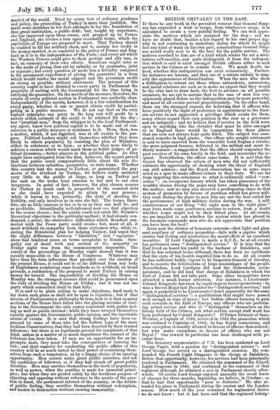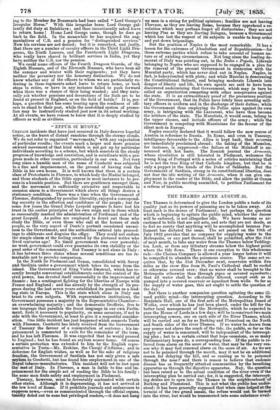BRITISH CHIVALRY IN THE EAST.
IF there be any truth in the prevalent rumour that General Simp- son has expressed a wish to resign, from whatsoever cause, it is calculated to create a very painful feeling. We can well appre- ciate the motives which are assigned for the step ; and we have no doubt that, besides a fair regard to his own proper dig- nity in not continuing to undertake duties for which he might feel any kind of want on his own part, conscientious General Simp- son would really seek to do the best for the public service. The motives ascribed to him are of a kind which render the act a meri- torious self-sacrifice, and quite distinguish it from the indisposi- tion which is said to exist amongst British officers either to seek service in the Crimea or to remain there. We much doubt, in- deed, whether this indisposition can exist extensively. Particu- lar instances are known, and they are of a nature unduly to mag- nify the appearances of disinclination. When the men who show a willingness to retreat are those whose antecedents, connexions, and moral relations are such as to make us expect that they would be the vary last to draw back, the first to advance on all possible occasions, we are apt to assume that in the ease of men less con- spicuously placed before us the indisposition may be more powerful, and must at all events prevail proportionately. On the other hand, there are the strongest reasons for believing that if officers who have positively the right of preference in appointment to the East- ern service do not appreciate a privilege which exists for them, many others regard their own position in the rear as a grievance and an indignity ; and we believe that if service in the field were open to anything like the chivalry that must be alive amongst us in England there would be competition for those places that are now not always kept quite filled. The subject has occa- sioned remarks in high places. One officer who sought retirement is said to have received from the venerable Lord Raglan a rebuke, the more poignant because delivered in the mildest and moat fa- therly manner—a suggestion that the officer should remember the past services of his own family in the field, and receneider the re- quest. Nevertheless, the officer came home. It is said that the Queen has observed the return of men who did not sufficiently estimate the opportunity of showing what the blood of England can still achieve; and the Royal observation has in some cases acted as a spur to make officers return to their duty. We are far from imputing this reluctance to what is ordinarily called " cow- ardice "; an overgrown luxury which has taken possession of the wealthy classes during the peace may have something to do with the matter; and we may also discover a predisposing cause in that system of promotion by favour of purchase which has given mili- tary rank during the peace to men who are not the best suited for the performance of high military duties during the war. A self- consciousness of not being "the right man in the right place" may have made some gentlemen anxious to return, from a doubt whether home might not be their fittest place. At all events, we are impelled to ask whether the system which has placed in the foremost commands men who do not appreciate that position can have been the best?
Even now the shower of honorary rewards—that light and plea- sant auxiliary of ordinary promotion—falls with a caprice which creates bad feeling and neutralizes the moral effect of an excellent incentive. If Lord Cardigan is made a K.C.B., he at all events has performed some " distinguished service." It is true that the Earl lived on board his yacht in the harbour of Balaklava, and that he has returned home although there has been no certificate that the state of his health required him to do so. At all events he has sufficient bodily vigour to be Inspector-General of Cavalry, and to receive the felicitations of large assemblages of the people. Nevertheless, Lord Cardigan did lead the Dobrudscha recon- naissance, and he did lead that charge at Balaklava in which the Earl of Liman did not take part. Some other inequalities have attracted a much keener attention. For instance, a Lieutenant- Colonel Kingscote has risen by rapid steps in brevet promotions : be was a brevet Major last December for " distinguished services," and again is permitted to be Lieutenant-Colonel apparently for the same " distinguished services "; a qualification that might have passed well enough in time of peace : but Indian officers burning to gain such rewards in the East of Europe, nay officers who are perform- ing actual service and who do " distinguish " themselves on the bloody field of the Crimea, ask what service except staff work has been performed by Colonel Kingscote ? If Prince Edward, of Saxe- Weimar, a Captain of 1846, received in 1854 the promotion which was confined to Captains of 1843, he has Royal connexions, and some exception is usually allowed in favour of officers thus related ; but why make exceptions in favour of officers who are not
Royal One reward in particular has been challenged with pe- culiar force.
The honorary augmentative of C.B. has been conferred on Lord George Paget, with a pension for " distinguished service "; and Lord George has served on a distinguished occasion. He com- manded the Fourth Light Dragoons in the charge at Balaklava. Before that opportunity, however, his services had been principally rendered in Parliament. He obtained the command of the Fourth Light Dragoons in 1846, and continued in the command of that regiment although he obtained a seat in Parliament shortly after- wards. Of course Lord George enjoyed annually the usual leave of absence for three months, beginning, we believe, in October ; so that he had that opportunity "pour se distraire." He also at- tended his place in Parliament during the session and the London season. How much of the year remained for regimental duties we do not know ; but it has been said that the regiment belong-
ing to the Member for Beamnaris had been called '" Lord George's Irregular Horse." With this irregular horse Lord George gal. lantly did duty at Balaklava ; and then incontinently asked leave to return home ! Home Lord George came, though he does go back to the field. In the meanwhile he has acquired the aug- mentatives of C.B. and a pension for " distinguished services." Now his services are not denied ; but it is remarked, and justly, that there are a number of cavalry officers in the Third Light Dra- goons, the Ninth Lancers, and the Fourteenth Light Dragoons, who really have shared in brilliant services in India, yet they have neither the C.B. nor the pension.
We could name officers of the Fourth Dragoon Guards, of the Eighth Hussars, and of the Eleventh Hussars, who have been all the summer and winter with their regiments; yet they have neither the pecuniary nor the honorary distinction. We do not know whether any of the officers to whom we are particularly re- ferring in these regiments asked leave to return home, or took steps to retire, or have in any instance failed to push forward when there was a chance of their being wanted ; and they natu- rally ask whether pensions and decorations of the Bath are to be found at present in England, or on the field of battle? It is, per- haps, a question that has sonic bearing upon the readiness of offi- cers to stand to their post, while the accredited system of promo- tion may be instructively studied just now in its actual working. At all events, we have reason to know that it is deeply studied by officers as well as civilians.



























 Previous page
Previous page